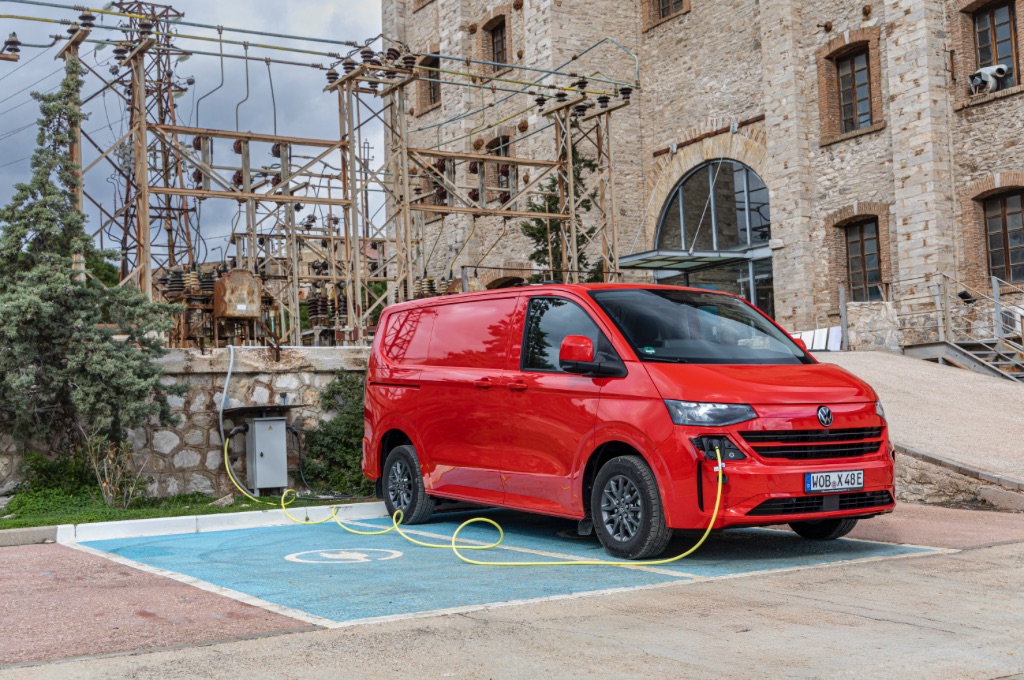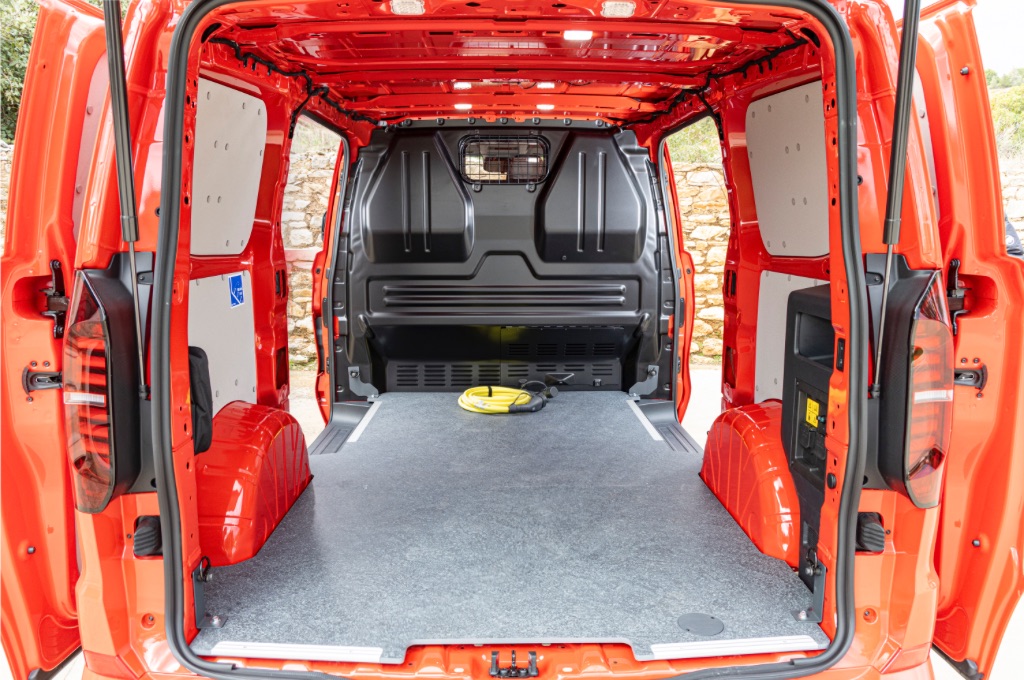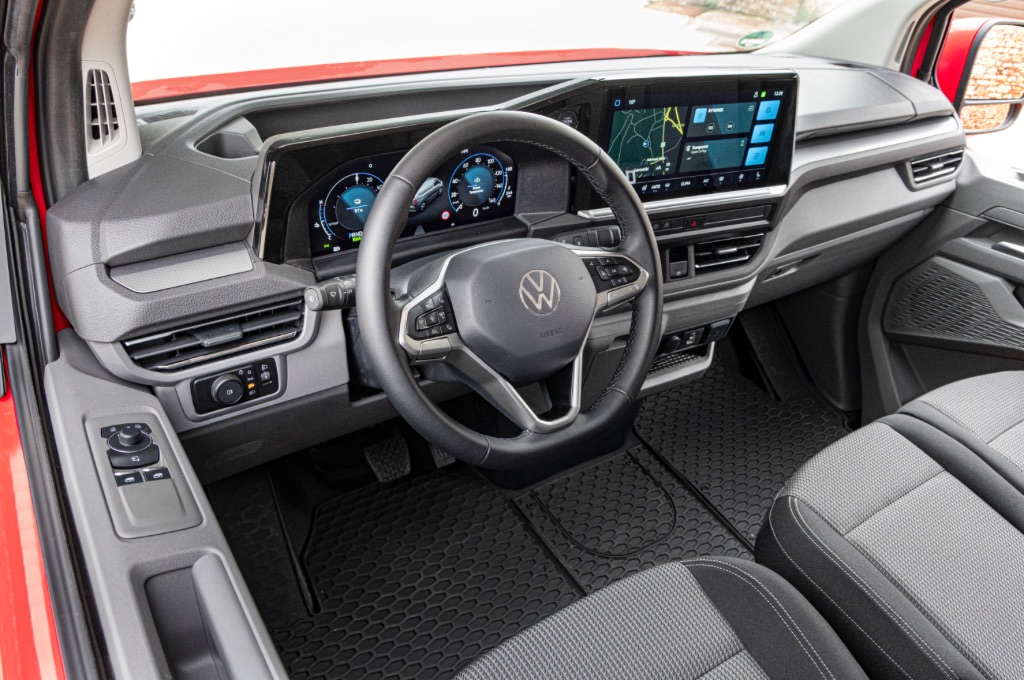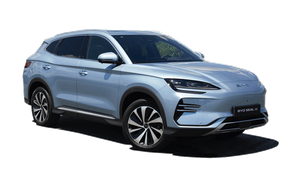It’s all part of a big corporate deal which saw Ford get VW’s bits to use for the Explorer and Capri, while VW gets the Transit to rehash as this. It’s been very controversial, with customers rushing to buy the last of the ‘real’ Transporters. This isn’t the real thing, they say….But look at the positive side. Sharing the cost means we get a better van – whether it’s a Ford or a Volkswagen.
That’s especially true when you’re taking about this electric version. We have called the Transit Custom the new benchmark in this sector, so copying Ford’s homework seems like a good idea.
All versions come with a 64kWh battery pack, offering a maximum of 209 miles range on the WLTP cycle. There are two motors available with either 136 or 218 horsepower.
There are also two wheelbases: standard L1 or extended L2, with one roof height – H1, which at under two metres in height will fit in a standard construction domestic garage.
Range, Battery and Charging

Depending on the model, the Transporter has between 192 and 201 mile range. The 64kWh battery is the only option currently, although a PHEV is planned for 2026.
Charging times are generally in-line with rivals and the same as the Ford's - 125kW DC rapid charging will get you from 10-80% charge in about 40 minutes. There's only an 11kW AC charge capacity though, which might be a disappointment for companies who have three-phase power supplies and want to get faster top ups without the expense of DC rapid chargers. Depending on the model, the Transporter has between 192 and 201 mile range. The 64kWh battery is the only option currently, although a PHEV is planned for 2026.
Charging times are generally in-line with rivals and the same as the Ford's - 125kW DC rapid charging will get you from 10-80% charge in about 40 minutes. There's only an 11kW AC charge capacity though, which might be a disappointment for companies who have three-phase power supplies and want to get faster top ups without the expense of DC rapid chargers.
Practicality, Payload and Dimensions

Total payload is less than diesel models at between 1013kg and 1088kg depending on the spec – that’s a lot more than the Buzz’s 592kg. The 2300kg towing capacity in smaller than the diesel's too. Oh – and you can put up to 170kg on the roof rack.
The load space is the same though. In the shorter L1 form, the Transporter offers 5.8 cubic metres of cargo space, with the longer wheelbase L2 adding an extra cubic metre. There’s a 1,400mm aperture for the back door and 1,932mm of space between the arches.
The load length is 2,602mm for the SWB and 3,002mm for the LWB. To save you having to put copper pipes and carpet rolls on the roof, there is also a hatch in the bulkhead which allows you to poke long loads into the space under the front seat. It adds another 448mm to the totals. If that's still not long enough and you need to look upwards, the roof rack can hold a hefty 170kg.
The Transporter also has some unusually bright LED lights in the load area - they are good enough to illuminate a football match at midnight.
A pair of 230v power sockets available in the load bay, which can supply up to 2,300 W - that's enough for corded power tools or means you can recharge cordless items between jobs.
It can tow too – a 2,300kg towing weight is right at the top of its class, although 500 kg down on the diesel.
Interior, Seating and Technology

There's a bit of prejudice among current Transporter owners, who expect a certain level of quality inside a VW van and imagine that the Ford bits inside the new model won't be up to scratch. They needn't worry. There's a Volkswagen steering wheel to add a difference and everything else feels at least as well made as any 'proper' VW van.
Another difference over the Ford is the infotainment, as the Transporter uses a VW system and screens. They work well enough, although there are fewer physical buttons than in the Transit and the display in front of the driver is a little too busy for our liking - it is info overload sometimes.
Most van versions offer three seats across the front. The driver gets the most comfortable chair, as you'd expect, with the other pair feeling a little too hard for us.
The electric vans all have heated seats and air con as standard.
Motors, Performance and Handling
Just like the e-Transit Custom, the VW Transporter is great to drive – Volkswagen have wisely decided to leave the dynamics alone. The only real change is the fitment of all-season tyres as standard, an unusual move which was requested by big fleets as it reduces the overall TCO. It also makes the van much better in slippery weather of course; something which is welcome as the traction can be an issue if the van has little weight over the driven back wheels.
Other than that, the rear-wheel-drive has a benefit make it a lot of fun to drive, especially in Sport mode. The ride quality is impressive, too, only becoming caught out on really badly-surfaced roads.
There are two motors available with either 136 or 218 horsepower. The 0-62 is 8.6 seconds regardless of the power output, presumably because that is fast enough and to make it any faster would cause insurance brokers to have kittens.The diesel? 13.4 seconds at best. Most will only manage 16.9. Take that, derv lurvers.
Both motors provide the same 415Nm of torque too, and have one regen mode accessed by a 'B' button on the gear selector stalk.
Running costs, Pricing and Specs
For the latest monthly offers on this or any other van, with free fast delivery, call our partner Vanaways on 0800 368 3286
The e-Transporter comes in two trim levels – Commerce Plus and Commerce Pro.
The Commerce Plus has some niceties such as heated seats, mudflaps, all season tyres and a heat pump. The Pro adds 16-inch alloys, a heated windscreen, wireless phone charging and extra USB ports.
The list prices are largely irrelevant in this market as most vans are bought with finance, but crucially the VW has slightly lower purchase prices and better residual values, which should mean the total cost of ownership is lower.
If that wasn't enough of a sweetener, Volkswagen throws in a package called the 5+ Promise, which comprises of five services, two MOTs, a five-year warranty and five years’ roadside assistance. The Ford? Three years warranty and no free services.
VW also says it has its own production line in the Ford factory, along with extra quality checks. They really want to make sure those traditional VW customers are reassured.Of course it costs more than the diesel to go electric – about £5,300 more AFTER you’ve taken the grant off, but as a bonus the EV includes heated seats, upgraded air-con, and a tyre mobility kit – and oddly all season tyres.
Verdict:
It might be controversial to some, but the Transporter is undoubtably a great van in all the ways that matter. OK – it’s not a ‘proper’ Volkswagen like the previous Transporters but sharing tech with Ford means you get a better vehicle.
With the VW you also got a couple of deal sweeteners over the Transit, like the lower monthly costs and better warranty. I reckon that makes the Transporter the van I’d choose. But in the end it’ll come down to the deal you can find – or just your own taste.
































